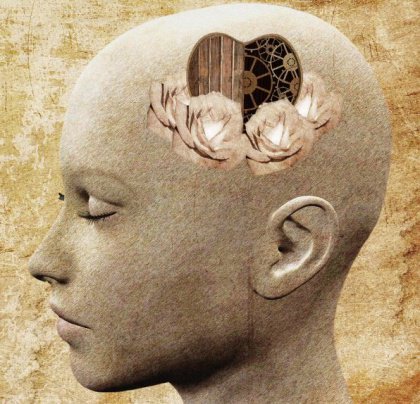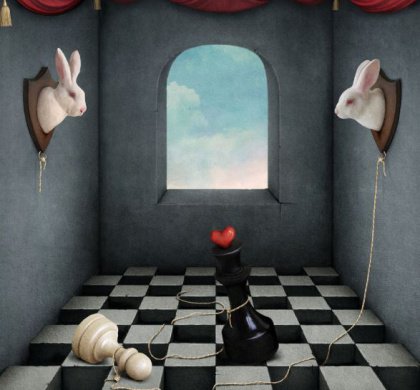5 Symptoms of Emotional Intoxication

I feel vulnerable, I get angry easily, and every once in a while I feel the need to just get up and leave everything. I go from being interested to indifferent in a split second; no sooner do I motivate myself to start a project than I become completely bored by it.
My life is like a never-ending roller coaster ride; laughter and tears are around every corner and surprise me when I least expect them. It’s a huge effort to manage my present worries, past concerns, and the overwhelming insecurity I feel.
I frequently react in ways that are out of proportion to the circumstances and I’m unable to express my thoughts and emotions clearly, which has become very problematic. What’s worse, as soon as I decide I’m totally fed up with everything and everyone, I’m overcome with a deep need to have someone take me by the hand…
Does any of this resonate with you or remind you of someone you know? This is how someone suffering from emotional intoxication might describe his or her experience. Most of us understand the effects of alcohol intoxication; we know that our senses are altered, our ability to react deteriorates, our pulse slows…
…but, do we know the signs of emotional intoxication?
If you’re going through or have gone through a very emotional time in your life, you might be or have been emotionally intoxicated. Since, at our core, we’re complex emotional beings, the causes of emotional intoxication are varied, but it’s generally the result of failing to dedicate the necessary time each day to cultivating our inner selves.
1. Your perceptions change
Because you’re seeing the world through the lens of your emotions, you don’t listen to reason, to yourself, or others. Doing so seems like a waste of time to you; however, in reality, nothing could be further from the truth.
You develop nervousness and impatience in the face of unexpected emotions that are out of your control, since you don’t know whether or how you can manage what comes next.

2. Your insecurities take over
Your insecurities overtake and direct your life. You become more reactive and defensive, your self esteem hits rock bottom and every situation makes you feel vulnerable. While it’s true that you might not be at your best, your emotions are making things worse by keeping you from recognizing your value and abilities. You become more and more emotionally dependent, to the point where sometimes you think you can’t do anything for yourself.

3. You’re blocked emotionally
Allowing your emotions to guide your actions without first subjecting them to your mental filter limits your ability to communicate and thrive. As a result of your emotional intoxication, you frequently don’t know how to respond to the situations of your life.
If you’re emotionally intoxicated you don’t think before you speak and can’t effectively gain perspective about situations and events. Confucius said, you should always keep a cool head, a warm heart, and a long hand. When we react rashly with a “hot” head, our actions are based on our emotions and impulses rather than coming from our deeper sense of self.

4. Emotional vertigo keeps you trapped in harmful behaviors
“Fear of letting go,” is what I call emotional vertigo. This is fear in its purest form; in short, the terror of bringing ourselves face to face with the emptiness of loss. It’s a fear of the pain of losing what we love and of the weakness created by our masochism.
You feel frustrated if you wander from the path you’ve imagined for your life and your worry that doing so will bring about a catastrophe that will completely derail your life. You don’t feel capable of going on living if you abandon the harmful habits and people you’ve surrounded yourself with, even though you know that they aren’t good for you.

5. You lack mental energy
If you’re emotionally intoxicated, it’s likely that you often feel like you’re not hearing what others are saying, and that both your attention and your memory have become completely selective.
This becomes especially apparent when you find yourself in an argument. You twist the other person’s words, listening only according to your own beliefs, and end up basing your conclusions upon your perceived problems and frustrations.
It’s not that you don’t want to engage in mature, reasonable discussion, but rather that it takes tremendous mental energy for you to see things from perspectives other than your own. You don’t have the capacity to deal with even the most everyday challenges and interactions with others.

How to prevent emotional intoxication?
It’s important to understand that living under the influence of our emotions and insecurities is extremely taxing. We can’t effectively interpret reality and we’re much more likely to say or do things that we’ll later regret.
Given these concerns, it’s crucial that we recognize when we’re being controlled by our emotions and that we give ourselves the necessary time to let them settle so that we can accept them.
Being aware of these five symptoms gives us the ability to quickly identify when we are intoxicated so that we can take the time out we need in order to restore our emotional balance and enhance our wellbeing.
Main image courtesy of Little.
I feel vulnerable, I get angry easily, and every once in a while I feel the need to just get up and leave everything. I go from being interested to indifferent in a split second; no sooner do I motivate myself to start a project than I become completely bored by it.
My life is like a never-ending roller coaster ride; laughter and tears are around every corner and surprise me when I least expect them. It’s a huge effort to manage my present worries, past concerns, and the overwhelming insecurity I feel.
I frequently react in ways that are out of proportion to the circumstances and I’m unable to express my thoughts and emotions clearly, which has become very problematic. What’s worse, as soon as I decide I’m totally fed up with everything and everyone, I’m overcome with a deep need to have someone take me by the hand…
Does any of this resonate with you or remind you of someone you know? This is how someone suffering from emotional intoxication might describe his or her experience. Most of us understand the effects of alcohol intoxication; we know that our senses are altered, our ability to react deteriorates, our pulse slows…
…but, do we know the signs of emotional intoxication?
If you’re going through or have gone through a very emotional time in your life, you might be or have been emotionally intoxicated. Since, at our core, we’re complex emotional beings, the causes of emotional intoxication are varied, but it’s generally the result of failing to dedicate the necessary time each day to cultivating our inner selves.
1. Your perceptions change
Because you’re seeing the world through the lens of your emotions, you don’t listen to reason, to yourself, or others. Doing so seems like a waste of time to you; however, in reality, nothing could be further from the truth.
You develop nervousness and impatience in the face of unexpected emotions that are out of your control, since you don’t know whether or how you can manage what comes next.

2. Your insecurities take over
Your insecurities overtake and direct your life. You become more reactive and defensive, your self esteem hits rock bottom and every situation makes you feel vulnerable. While it’s true that you might not be at your best, your emotions are making things worse by keeping you from recognizing your value and abilities. You become more and more emotionally dependent, to the point where sometimes you think you can’t do anything for yourself.

3. You’re blocked emotionally
Allowing your emotions to guide your actions without first subjecting them to your mental filter limits your ability to communicate and thrive. As a result of your emotional intoxication, you frequently don’t know how to respond to the situations of your life.
If you’re emotionally intoxicated you don’t think before you speak and can’t effectively gain perspective about situations and events. Confucius said, you should always keep a cool head, a warm heart, and a long hand. When we react rashly with a “hot” head, our actions are based on our emotions and impulses rather than coming from our deeper sense of self.

4. Emotional vertigo keeps you trapped in harmful behaviors
“Fear of letting go,” is what I call emotional vertigo. This is fear in its purest form; in short, the terror of bringing ourselves face to face with the emptiness of loss. It’s a fear of the pain of losing what we love and of the weakness created by our masochism.
You feel frustrated if you wander from the path you’ve imagined for your life and your worry that doing so will bring about a catastrophe that will completely derail your life. You don’t feel capable of going on living if you abandon the harmful habits and people you’ve surrounded yourself with, even though you know that they aren’t good for you.

5. You lack mental energy
If you’re emotionally intoxicated, it’s likely that you often feel like you’re not hearing what others are saying, and that both your attention and your memory have become completely selective.
This becomes especially apparent when you find yourself in an argument. You twist the other person’s words, listening only according to your own beliefs, and end up basing your conclusions upon your perceived problems and frustrations.
It’s not that you don’t want to engage in mature, reasonable discussion, but rather that it takes tremendous mental energy for you to see things from perspectives other than your own. You don’t have the capacity to deal with even the most everyday challenges and interactions with others.

How to prevent emotional intoxication?
It’s important to understand that living under the influence of our emotions and insecurities is extremely taxing. We can’t effectively interpret reality and we’re much more likely to say or do things that we’ll later regret.
Given these concerns, it’s crucial that we recognize when we’re being controlled by our emotions and that we give ourselves the necessary time to let them settle so that we can accept them.
Being aware of these five symptoms gives us the ability to quickly identify when we are intoxicated so that we can take the time out we need in order to restore our emotional balance and enhance our wellbeing.
Main image courtesy of Little.
This text is provided for informational purposes only and does not replace consultation with a professional. If in doubt, consult your specialist.







